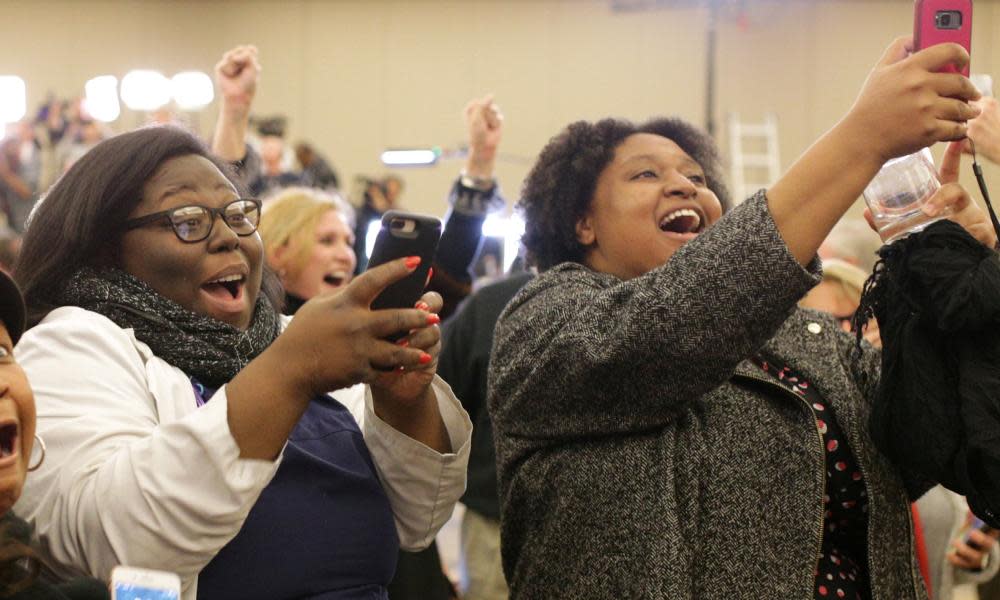The African American voters at the heart of Doug Jones' Alabama victory

Doug Jones’s shock victory in Alabama relied heavily on a key component of the Democratic coalition: African American voters.
Black voters have long been the linchpin of the Democratic base. But African American turnout has sagged recently in non-presidential elections. Jones was able to reverse that trend on Tuesday. In a state where African Americans make up 26% of the population, they made up 29% of the electorate, according to exit polls, and backed Jones by a margin of 96% to 4%.
On Wednesday, African American voters saw the result as a small step forward in interviews with the Guardian outside a Montgomery supermarket. They viewed the result not in light of Alabama’s troubled racial history but simply as a win for a candidate they supported in Jones.
Alisha Coleman of Montgomery praised the victorious Democrat as “an honest man” who will “make a change”. Betty Carter put the race in a broader perspective because of the possibility opened up by the Alabama result of Democrats taking a majority in the Senate next year. She added: “It made the national news, affected the stock market and I think it will be maybe somewhat of a turnaround for Alabama, for as far as politics and as far as racism.”
Early life
The 63-year-old grew up in the working-class city of Fairfield, just west of Birmingham, an area once dominated by the steel industry. His father was a steelworker and he spent time working in a mill when not in school
Democratic roots and the KKK
Jones got his start in government as an aide to the last Democrat to serve a full term in the Senate from Alabama, the late Howell Heflin.
Years before running for the Senate himself, Jones became known for prosecuting two KKK members for the bombing of Birmingham's 16th Street Baptist church in 1963 which killed four black girls.
After his appointment as US attorney in Birmingham in 1997, Jones led a team of federal and state attorneys during trials that resulted in the convictions of Thomas Blanton Jr in 2001 and Bobby Frank Cherry in 2002.
Michael Blake, the vice-chair of the DNC and a New York state assemblyman, saw the results as part of an important historical moment for African American voters. “We’ve had, in the past five weeks, two black lieutenant governors [in New Jersey and Virginia], a black female mayor in Charlotte, a black female mayor in Atlanta, and a win for Doug Jones, who prosecuted Klansmen. How can you not feel validated?”
Blake also saw broader ramifications from the increase in turnout and the DNC’s efforts organizing on the ground. “You had black turnout essentially reach and exceed where it was in 2008,” he noted. “It shows that we can and will win everywhere.” He also noted that increase in turnout was achieved despite Alabama’s restrictive voting laws.
Attempts to reach out to black voters were crucial to Jones’s campaign. In the final days he brought in prominent African American surrogates including Senator Cory Booker of New Jersey and the former governor Deval Patrick of Massachusetts and held events in cities with significant African American populations such as Birmingham, Montgomery and Selma. Black areas were filled with signs proclaiming “vote or die” and the Jones campaign emphasized his role successfully prosecuting two members of Ku Klux Klan involved in the 16th Street church bombing in Birmingham, which killed four African American girls in 1963.
The result was that turnout surged in predominantly African American counties in the black belt and in urban areas with large African American populations. In Greene County, Alabama, which is 80% percent black, turnout reached 78% of 2016 levels. In contrast, in white rural areas, turnout was just over half of that reached in 2016, when Hillary Clinton lost the state in a landslide. In other counties, Jones received more votes than Clinton did in 2016, including in Moore’s home county of Etowah.
Jones also benefited from the fact that Moore, who had a history of controversial comments on civil rights, including the statement that the US was last great during the era of slavery, repelled African American voters.
At a polling place in Montgomery on Tuesday, African American voters couldn’t even summon words to describe their contempt for Moore. “No comment,” said Sequoia Smith of Montgomery before breaking into knowing laughter and walking away when asked about Moore.
The question remains what effect Jones’s election will have on a state that ranks near the bottom in almost every economic indicator and has been beset by political scandal in recent years.
Sarah Smith of Montgomery said simply on Wednesday: “I hope it makes things better.”

 Yahoo News
Yahoo News 
